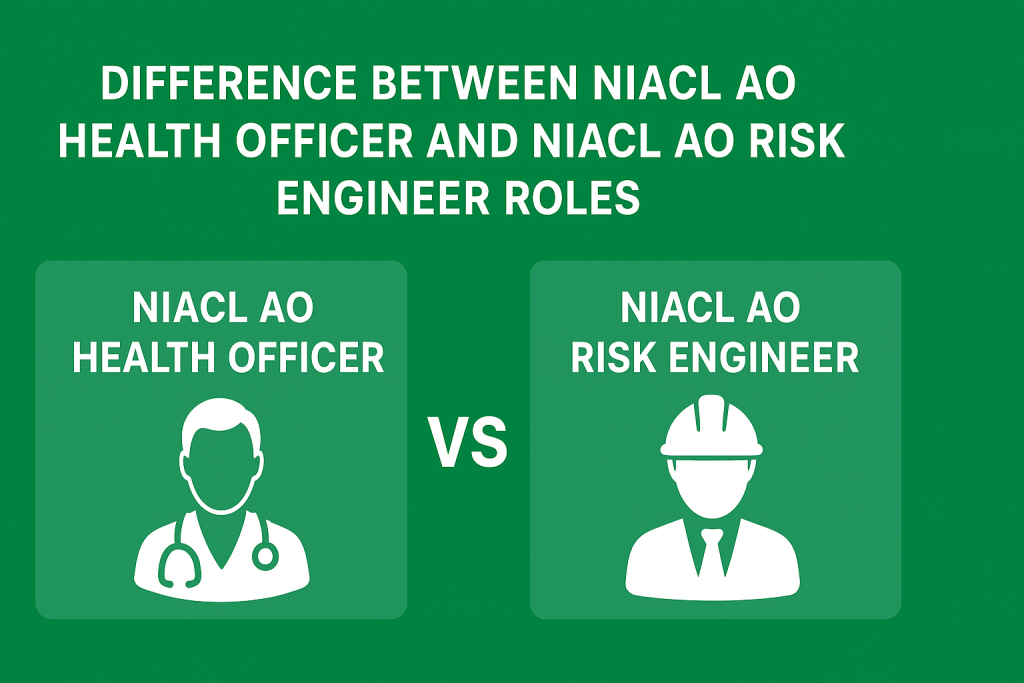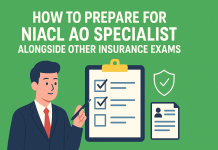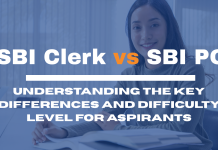The New India Assurance Company Limited (NIACL) conducts the Administrative Officer (AO) Specialist exam every year to recruit candidates in different professional streams. Among these, two important specialist roles are Health Officer and Risk Engineer. Many aspirants preparing for the NIACL AO Specialist exam are confused about the difference between these two roles, their responsibilities, and how to prepare for them.
This article will give you a complete understanding of the NIACL AO Health Officer vs NIACL AO Risk Engineer roles, their eligibility, job profile, career prospects, and preparation strategy. If you are targeting these positions, this guide will help you make an informed choice.

Overview of NIACL AO Specialist Roles
The NIACL AO Specialist exam recruits candidates in domains like Health, IT, Legal, Finance, and Engineering. While the prelims and mains exam structure is similar for all, the professional knowledge section in the mains exam differs for each specialization. This is where the Health Officer and Risk Engineer roles require focused study.
Both these positions demand domain expertise, but their work profiles and long-term career paths are very different.
NIACL AO Health Officer Role
The NIACL AO Health Officer is responsible for handling health insurance-related cases. The focus of the role is on medical knowledge and the application of that knowledge in evaluating claims, policies, and risk.
A Health Officer works as a link between the company and policyholders by ensuring that health claims are settled fairly, quickly, and as per company policies. They also contribute to the design of health insurance products and evaluate the risks associated with medical coverage.
NIACL AO Risk Engineer Role
The NIACL AO Risk Engineer is a technical role. A Risk Engineer is responsible for evaluating risks in industries, infrastructure, and large projects. They use their engineering knowledge to assess the safety standards of factories, plants, and industrial setups that are insured by the company.
Risk Engineers often travel to sites, conduct inspections, and provide reports on whether an industry is following safety norms. They help the company decide the extent of coverage and premium for such clients. Their work reduces the chances of losses and ensures that claims are genuine.
Comparison: NIACL AO Health and NIACL AO Risk Engineer
The major differences between the two roles can be seen in the following aspects:
| Feature | NIACL AO Health Officer | NIACL AO Risk Engineer |
| Educational Background | Candidates usually from medical or paramedical fields (MBBS, BDS, BAMS, BHMS, BPT, Nursing) | Candidates from engineering streams like Mechanical, Electrical, Civil, Chemical, Industrial, Safety Engineering |
| Nature of Work | Deals with health claims, medical evaluation, product design in health insurance | Focuses on industrial site inspection, risk assessment, and safety analysis |
| Work Environment | Mostly office-based with desk reviews of health claims | Includes both office and field visits to factories, plants, and industrial sites |
| Knowledge Required | Medical terminology, healthcare systems, insurance regulations | Engineering concepts, safety standards, fire protection, and risk control measures |
| Main Role in Insurance | Ensuring fair settlement of health insurance claims | Reducing company’s risk exposure in industrial and infrastructure insurance |
| Travel Requirement | Minimal | Frequent site visits required |
| Long-term Career Path | Specialist in health insurance and claim management | Expert in risk management and engineering surveys |
Job Responsibilities of NIACL AO Health Officer
A Health Officer in NIACL is expected to:
- Examine and evaluate health insurance claims.
- Verify medical documents submitted by policyholders.
- Ensure claims are settled as per company policy and IRDAI regulations.
- Assist in designing new health insurance products.
- Provide expert medical input to the underwriting team.
- Prevent fraudulent health claims by careful scrutiny.
This role demands strong knowledge of healthcare systems, an eye for detail, and the ability to handle sensitive medical data with care.
Job Responsibilities of NIACL AO Risk Engineer
A Risk Engineer’s responsibilities include:
- Conducting on-site inspections of factories, plants, and projects.
- Assessing risks related to fire safety, industrial hazards, and machinery.
- Suggesting safety improvements to clients.
- Preparing detailed technical reports for underwriting teams.
- Helping the company decide coverage limits and premiums.
- Preventing losses by identifying weak points in client systems.
This role requires analytical skills, technical knowledge, and a willingness to travel frequently.
NIACL AO Health and NIACL AO Risk Engineer Eligibility Criteria
The NIACL AO eligibility criteria for both roles differ due to their professional requirements. We have given you a gist of what they are in the table below:
| Criteria | Health Officer | Risk Engineer |
| Educational Qualification | MBBS, BDS, BAMS, BHMS, BPT, Nursing, or other paramedical degrees recognized by MCI/UGC | B.E./B.Tech in Mechanical, Electrical, Civil, Chemical, Industrial, Safety Engineering |
| Age Limit | Generally 21–30 years (relaxations as per government rules) | Generally 21–30 years (relaxations as per government rules) |
| Other Requirements | Registration with Medical Council of India (for MBBS/BDS) | Practical knowledge of engineering safety standards |
NIACL AO Health and NIACL AO Risk Engineer: Work-Life Balance
Aspirants often wonder which role offers better work-life balance. The Health Officer role is more office-based and involves desk work. This allows for relatively stable hours and limited travel.
On the other hand, the Risk Engineer role involves frequent travel to industrial sites, which can make working hours longer and unpredictable. However, many candidates enjoy the variety and field exposure that comes with the Risk Engineer role.
NIACL AO Health and NIACL AO Risk Engineer: Career Growth
Both roles have good career prospects within NIACL and in the broader insurance industry.
Health Officers grow into senior positions such as Health Insurance Specialists, Claims Managers, or Heads of Health Insurance divisions. They can also move to private health insurance companies.
Risk Engineers can move into senior positions in risk management, survey, and underwriting. With experience, they can also work in multinational insurance or reinsurance companies. Their technical expertise is valued in industries beyond insurance, such as consulting and safety management.
NIACL AO Health and NIACL AO Risk Engineer: Preparation Strategy
If you are preparing for the NIACL AO Specialist exam, your preparation strategy should combine common sections with professional knowledge.
For both roles, the prelims exam includes reasoning, quantitative aptitude, and English language. These are common across NIACL AO and other insurance exams, so your practice here should be consistent.
For Health Officer professional knowledge, focus on:
- Basics of human anatomy and physiology.
- Common diseases and their treatments.
- Medical terminology.
- IRDAI regulations on health insurance.
- Recent developments in India’s health insurance sector.
For Risk Engineer professional knowledge, focus on:
- Engineering fundamentals from your branch (Mechanical, Civil, Electrical, etc.).
- Fire safety and industrial hazards.
- Risk management principles.
- Codes and safety standards used in industries.
- Case studies of industrial accidents and insurance claims.
Salary and Perks of Both Roles
Both roles come with attractive salaries and perks as NIACL AO Specialists. Let’s take a look at the perks of both NIACL AO Health and NIACL AO Risk Engineer roles from the table below:
| Component | Health Officer | Risk Engineer |
| Basic Pay | Around ₹50,000/month (starting) | Around ₹50,000/month (starting) |
| Gross Salary | ₹80,000–₹85,000/month (approx.) | ₹80,000–₹85,000/month (approx.) |
| Allowances | HRA, DA, Medical Benefits, Insurance Coverage | HRA, DA, Travel Allowances, Insurance Coverage |
| Special Benefits | Stability, healthcare-related exposure | Field exposure, technical expertise in industries |
The salary structure is the same as per NIACL AO scale, but Risk Engineers may receive additional travel-related allowances due to site visits.
Which Role Should You Choose?
The choice between NIACL AO Health Officer and NIACL AO Risk Engineer depends on your educational background and career interests.
If you come from a medical or paramedical background, the Health Officer role is a natural fit. It allows you to use your medical expertise in an office environment with relatively stable work hours.
If you are an engineering graduate with an interest in safety, site inspections, and industrial risk analysis, the Risk Engineer role is the right choice. It gives you exposure to diverse industries and offers a dynamic career.
Summing Up
The difference between NIACL AO Health Officer and NIACL AO Risk Engineer roles lies in their domain expertise, job responsibilities, and work environment. While Health Officers focus on medical evaluation and health insurance claims, Risk Engineers concentrate on industrial safety and risk assessment. Both roles are equally important for NIACL and come with strong career growth opportunities.
ixamBee specializes in providing expert guidance and resources for banking exams 2025, ensuring that you are well-prepared for the Upcoming Bank Exams like RBI Grade B, NABARD Grade B, IBPS SO, and more. Our courses align with the bank exam calendar 2025, covering all the essential topics. With a focus on the upcoming bank jobs, our Previous Year Papers, BeePedia, SSC CGL, SSC CHSL, SSC MTS and other Mock Tests are designed to help you excel in upcoming banking exams.
Also Read:
How to Prepare for NIACL AO Specialist Alongside Other Insurance Exams
Mistakes to Avoid while Preparing for NIACL Health & Risk Engineer Exams
Why Choose a Career as NIACL AO Health & Risk Engineer? A Complete Guide














